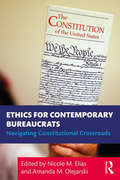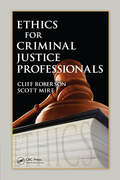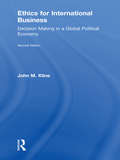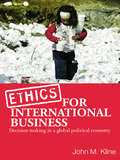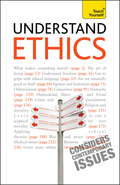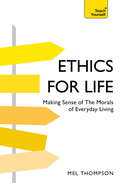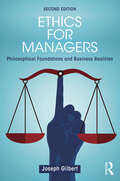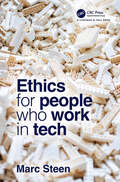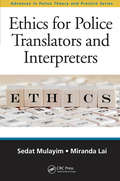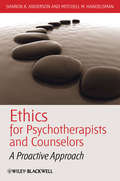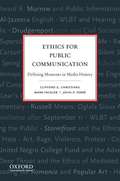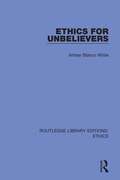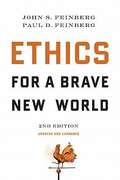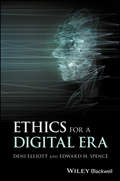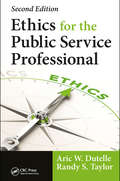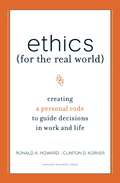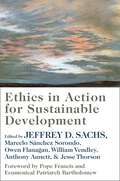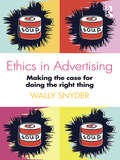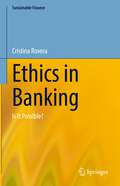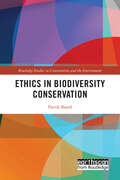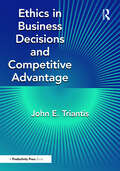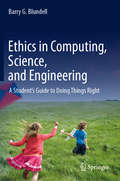- Table View
- List View
Ethics for Adversaries: The Morality of Roles in Public and Professional Life
by Arthur Isak ApplbaumThe adversary professions--law, business, and government, among others--typically claim a moral permission to violate persons in ways that, if not for the professional role, would be morally wrong. Lawyers advance bad ends and deceive, business managers exploit and despoil, public officials enforce unjust laws, and doctors keep confidences that, if disclosed, would prevent harm. Ethics for Adversaries is a philosophical inquiry into arguments that are offered to defend seemingly wrongful actions performed by those who occupy what Montaigne called "necessary offices." Applbaum begins by examining the career of Charles-Henri Sanson, who is appointed executioner of Paris by Louis XVI and serves the punitive needs of the ancien régime for decades. Come the French Revolution, the King's Executioner becomes the king's executioner, and he ministers with professional detachment to each defeated political faction throughout the Terror and its aftermath. By exploring one extraordinary role and the arguments that can be offered in its defense, Applbaum raises unsettling doubts about arguments in defense of less sanguinary professions and their practices. To justify harmful acts, adversaries appeal to arguments about the rules of the game, fair play, consent, the social construction of actions and actors, good outcomes in equilibrium, and the legitimate authority of institutions. Applbaum concludes that these arguments are weaker than supposed and do not morally justify much of the violation that professionals and public officials inflict. Institutions and the roles they create ordinarily cannot mint moral permissions to do what otherwise would be morally prohibited.
Ethics for Biomedical Engineers
by Jong Yong Foo Andrew P. Bradley Dennis Kwok-Wing Tam Stephen J. Wilson Winston GweeOver the last few decades, there are increasing public awareness of adverse events involving engineering failures that not only led to monetary losses but also more importantly, human injuries and deaths. Whilst it is vital for an engineering professional or student to acquire the necessary technical knowledge and skills in their respective field, they must also understand the ethical essences that are relevant to their profession. Engineering professionals like biomedical engineers, need to appreciate the fundamentals of best practices and recognise how any derivation from such practices can have undesirable impacts on human lives. Through this book, it is hoped that readers would draw the relevance between the study of ethics and biomedical engineering. The book would be a useful source and reference for college-level and university-level students. Moreover, the contents are written so as to also provide valuable insights even for existing biomedical engineers and those enrolled in continual engineering education programs.
Ethics for Contemporary Bureaucrats: Navigating Constitutional Crossroads
by Nicole M. Elias Amanda M. OlejarskiIn the current United States (U.S.) context, we are facing a constitutional crisis with frequent government shutdowns and new debates surrounding immigration, climate change, budgeting practices, and the balance of power. With competing interests, unclear policy, and inconsistent leadership directives, the question becomes: How do contemporary bureaucrats make sense of this ethically turbulent environment? This collection provides a lens for viewing administrative decision-making and behavior from a constitutional basis, as contemporary bureaucrats navigate uncharted territory. Ethics for Contemporary Bureaucrats is organized around three constitutional values: freedom, property, and social equity. These themes are based on emerging trends in public administration and balanced with traditional ethical models. Each chapter provides an overview of a contemporary ethical issue, identifies key actors, institutions, legal and legislative policy, and offers normative and practical recommendations to address the challenges the issue poses. Rooted in a respected and time-tested intellectual history, this volume speaks to bureaucrats in a modern era of governance. It is ideally suited to educate students, scholars, and public servants on constitutional values and legal precedent as a basis for ethics in the public sector.
Ethics for Criminal Justice Professionals
by Cliff Roberson Scott MireIncreasing concerns about the accountability of criminal justice professionals at all levels has placed a heightened focus on the behavior of those who work in the system. Judges, attorneys, police, and prison employees are all under increased scrutiny from the public and the media. Ethics for Criminal Justice Professionals examines the myriad of e
Ethics for International Business: Decision-Making in a Global Political Economy
by John KlineBusiness takes place in an increasingly global environment, crossing political and cultural boundaries that challenge corporate values. The central focus of this successful and innovative text lies in how to make and explain 'best choice' judgments when confronting ethical dilemmas in international business situations.The newly-updated version of this groundbreaking textbook continues to provide a topical and relevant analysis of the ethical dimensions of conducting business in a global political economy. From a starting point of applied ethics, the book introduces a common set of normative terms and analytical tools for examining and discussing real case scenarios. Extensive real-world examples, presented in the form of exhibits, cover issues including: foreign production, including sweatshops export of hazardous products testing and pricing of HIV-AIDS drugs advertising tobacco, alcoholic beverages and infant formula deceptive marketing techniques and bribery religious and social discrimination cultural impacts from 'music, movies and malls' environmental issues, including oil spills, rain forest preservation, global warming and genetically modified foods fair trade certification and consumer boycotts oil investments in the Sudan, Burma and Nigeria. To keep pace with the changing landscape of global business, this new edition features: updated exhibits that introduce new issues, including internet censorship and privacy, marketing and obesity, dumping electronic waste in Ghana, the costs of bottled water, and Wal-Mart’s supplier code in China increased coverage of issues arising in emerging markets updated descriptions and assessments of relevant international agreements seventeen new photographs that were chosen to accompany cases designed for classroom discussion "framing questions" to guide discussion of issues in topical chapters three additional figures that help depict the ethical analysis process. The continued globalization of business increases the relevance of this textbook and its unique focus on specifically international ethical challenges faced by business, where governments and civil society groups play an active role. While most business ethics texts continue to focus heavily on ethical theory, this textbook condenses ethical theory into applied decision-making concepts, emphasizing practical applications to real world dilemmas.Anyone with an interest in the ethical implications of international business, or the business implications of corporate responsibility in the global market, will find this book a thought-provoking yet balanced analysis. Clearly written, this has become the textbook of choice in this increasingly important field.
Ethics for International Business: Decision-Making in a Global Political Economy
by John M. KlineFirst published in 2004. Routledge is an imprint of Taylor & Francis, an informa company.
Ethics for Life (6th Edition)
by Judith A. BossA multicultural and interdisciplinary introductory ethics textbook that provides students with an ethics curriculum that has been shown to significantly improve student's ability to make real-life moral decisions.
Ethics for Life: Making Sense of the Morals of Everyday Living
by Mel ThompsonWhether you're a student studying philosophy at any level, or simply want to gain a deeper understanding of this fascinating subject, Understand Ethics is an accessible introduction to all the key theories and thinkers. Fully updated, this latest edition includes contemporary examples and discussion of current debates including terrorism, genetics and the media, helping you to grasp how ethics applies to life today.NOT GOT MUCH TIME?One, five and ten-minute introductions to key principles to get you started.AUTHOR INSIGHTSLots of instant help with common problems and quick tips for success, based on the author's many years of experience.TEST YOURSELFTests in the book and online to keep track of your progress.EXTEND YOUR KNOWLEDGEExtra online articles at www.teachyourself.com to give you a richer understanding of psychology.FIVE THINGS TO REMEMBERQuick refreshers to help you remember the key facts.TRY THISInnovative exercises illustrate what you've learnt and how to use it.
Ethics for Life: Making Sense of the Morals of Everyday Living (Teach Yourself General)
by Mel ThompsonWe all face questions on an almost daily basis related to truth and post-truth, particularly in the political sphere, terrorism, globalization, immigration and asylum, social responsibility, media and social-media ethics, and gender and LGBT issues. So how do you navigate this minefield? Ethics for Life is an accessible introduction to all the key theories and thinkers. It shows the relevance of ethical ideas and theories to everyday life, emphasizing the way our view of ourselves and the societies we live in is shaped by our moral values and the arguments they are based on.With contemporary examples and discussion of current debates including terrorism, genetics and the media, Ethics for Life will help you grasp how ethics applies to life today.
Ethics for Managers: Philosophical Foundations and Business Realities
by Joseph GilbertEthics for Managers introduces students to the philosophical underpinnings of business ethics and translates this theory into practical terms, demonstrating the moral implications of the decisions managers make. This edition features new material on global ethics, the financial downturn, and ethical sustainability. New, student-friendly features include: Learning objectives at the beginning of each chapter, which provide a roadmap to what is covered and how to use it. Cases that demonstrate real-world scenarios, allowing readers to grapple with real moral ambiguity. Discussion questions at the end of each chapter, which challenge students to see different moral perspectives and to practice good decision-making. A new chapter on international business ethics. Students of business ethics courses will find this compact, well-organized text a useful tool to understand ethics in the digital age.
Ethics for People Who Work in Tech
by Marc SteenThis book is for people who work in the tech industry—computer and data scientists, software developers and engineers, designers, and people in business, marketing or management roles. It is also for people who are involved in the procurement and deployment of advanced applications, algorithms, and AI systems, and in policy making. Together, they create the digital products, services, and systems that shape our societies and daily lives. The book’s aim is to empower people to take responsibility, to ‘upgrade’ their skills for ethical reflection, inquiry, and deliberation. It introduces ethics in an accessible manner with practical examples, outlines of different ethical traditions, and practice-oriented methods. Additional online resources are available at: ethicsforpeoplewhoworkintech.com.
Ethics for Police Translators and Interpreters (Advances in Police Theory and Practice)
by Sedat Mulayim Miranda LaiThis book examines the major theoretical foundations of ethics, before zooming in on definitions of professional practice and applied professional ethics, as distinct from private morals, in general and then focusing on professional ethics for translators and interpreters in police and legal settings. The book concludes with a chapter that offers a model for ethical decision making in the profession.
Ethics for Psychotherapists and Counselors: A Proactive Approach
by Sharon K. Anderson Mitchell M. HandelsmanEthics for Psychotherapists and Counselors utilizes positive discussions accompanied by a variety of thought-provoking exercises, case scenarios, and writing assignments to introduce readers to all the major ethical issues in psychotherapy. First book designed to engage students and psychotherapists in the process of developing a professional identity that integrates their personal values with the ethics and traditions of their discipline Authors take a positive and proactive approach that encourages readers to go beyond following the rules and to strive for ethical excellence Utilizes a variety of thought-provoking exercises, case scenarios, and writing assignments Authors present examples from their own backgrounds to help clarify the issues discussed Text emphasizes awareness of one’s own ethical, personal, and cultural backgrounds and how these apply to one’s clinical practice
Ethics for Public Communication: Defining Moments in Media History
by Clifford G. Christians; Mark Fackler; John P. FerreFocusing on one historic episode per chapter, Ethics for Public Communication is divided into three parts, each dedicated to one of the three major functions of the media within democratic societies: news, persuasion, and entertainment. Authors Clifford Christians, Mark Fackler, and John Ferré, three trusted scholars in the field, discuss media ethics from a communicative perspective, setting the book apart from other texts in the market that simply combine journalism with libertarian theory. Classic media ethics cases, like the publication of Rachel Carson's 1962 book Silent Spring, are covered in tandem with such contemporary cases as the creation of Al-Jazeera English and the controversy surrounding Ice-T's protest song, "Cop Killer."
Ethics for Unbelievers
by Amber Blanco WhiteOriginally published in 1949, this book examines the problems of morals in the light of science and philosophy and is addressed to those who do not accept revelation as the sanction for morality. The book discusses the individual, and in particular the origin and nature of conscience as well as society and communal codes of behaviour.
Ethics for a Brave New World (2nd Edition)
by Paul D. Feinberg John S. FeinbergThis updated and revised second edition analyzes the current literature regarding various ethical issues. It includes a new chapter on stem cell research and expanded material on other topics.
Ethics for a Digital Era
by Edward H. Spence Deni Elliott"Elliott and Spence have produced a tight, teachable, and timely primer on media ethics for users and creators of information in the digital age. Pitched at just the right depth of detail to provide a big picture contextualization of changing media practices grounded in concerns for democracy and the public good, the book explores and reflects the implications of the convergence of the Fourth and Fifth Estates with an open-access, hyper-linked architecture which invites self-reflective practice on the part of its users. " --Philip Gordon, Utah Valley University The rapid and ongoing evolution of digital technologies has transformed the way the world communicates and digests information. Fueled by a 24-hour news cycle and post-truth politics, media consumption and the technologies that drive it have become more influential in shaping public opinion, and it has become more imperative than ever to examine their social and ethical consequences. Ethics for a Digital Era provides a penetrating analysis of the ethical issues that have emerged as the digital revolution progresses, including journalistic practices that impact on the truth, reliability, and trustworthiness of communicating information. The volume explores new methods and models for ethical inquiry in a digital world, and maps out guidelines for web-based news producers and users to conceptualize ethical issues and analyze ethically questionable acts. In each of three thematic sections, Deni Elliott and Edward H. Spence reflect upon shifts in media ethics as contemporary mass communication combines traditional analog practices with new forms like blogs, vlogs, podcasts, and social media posts, and evolves into an interactive medium with users who both produce and consume the news. Later chapters apply a process of normative decision-making to some of the most important issues which arise in these interactions, and encourage users to bridge their own thinking between the virtual and physical worlds of information and its communication. Timely and thought-provoking, Ethics for a Digital Era is an invaluable resource for undergraduate and graduate students in media and mass communication, applied ethics, and journalism, as well as general readers interested in the ethical impact of their media consumption.
Ethics for the Public Service Professional
by Aric W. Dutelle Randy S. TaylorHeadlines of public service corruption scandals are painful reminders of the need for continuing education in the subjects of ethics and integrity. Public service professionals employed as government officials, forensic scientists, investigators, first responders, and those within the legal and justice systems, face daily decisions that can mean the difference between life or death and freedom or imprisonment. Sometimes, such decisions can present ethical dilemmas even to the most seasoned of professionals. Building on the success of the first edition, Ethics for the Public Service Professional, Second Edition serves as a single-source resource for the topic of ethics and ethical decision making as it relates to government service. While incorporating an examination of the history of ethics, codes and legislation, the book exposes the reader to the challenges faced by today’s public service professionals and administrators in incorporating ethics within daily decisions, procedures, and duties. Key features include: Current controversies in police, forensic, and other public service sectors including: racial profiling, evidence tampering, disaster response, and audits Important new mechanisms of accountability, including use-of-force reporting, citizen complaint procedures, and open government Contemporary news stories throughout the book introduce the reader to a broad range of ethical issues facing leaders within the public service workplace Chapter pedagogy including key terms, learning objectives, end-of-chapter questions, a variety of boxed ethical case examples, and references Ripped from the Headlines current event examples demonstrate actual scenarios involving the issues discussed within each chapter This in-depth text will be essential for the foundational development and explanation of protocols used within a successful organization. As such, Ethics for the Public Service Professional, Second Edition will help introduce ethics and ethical decision-making to both those new to the realm of forensic science, criminal justice, and emergency services and those already working in the field.
Ethics for the Real World
by Clinton D. Korver Bill Birchard Ronald A. HowardWe often make small ethical compromises for "good" reasons: We lie to a customer because our boss asked us to. We exaggerate our accomplishments on our résumé to get an interview. Temptation blindsides us. And we make snap decisions we regret.Minor ethical lapses can seem harmless, but they instill in us a hard-to-break habit of distorted thinking. Rationalizations drown out our inner voice, and we make up the rules as we go. We lose control of our decisions, fall victim to the temptations and pressures of our situations, taint our characters, and sour business and personal relationships.In Ethics for the Real World, Ronald Howard and Clinton Korver explain how to master the art of ethical decision making by:Identifying potential compromises in your own lifeApplying distinctions to clarify your ethical thinkingCommitting in advance to ethical principlesGenerating creative alternatives to resolve dilemmasPacked with real-life examples, this book gives you practical advice to respond skillfully to life's inevitable ethical challenges. Not only can you make right decisions, you can acquire new habits that will realize the best in yourself and transform your relationships.
Ethics in Action for Sustainable Development
by Sachs, Jeffrey D.; Sorondo, Marcelo Sánchez; Flanagan, Owen; Vendley, William; Annett, Anthony; Thorson, JesseThe Sustainable Development Goals, adopted by the United Nations in 2015, comprise an ambitious and sweeping agenda that unites economic, social, and environmental aims. What resources do the world’s religious and secular traditions offer in support of these objectives? Which principles do these traditions hold in common, and how can these shared values help advance global goals?This book presents an in-depth and deeply engaged conversation among interfaith religious leaders and interdisciplinary scholars and practitioners in pursuit of an ethical consensus that could ground sustainable development efforts. Drawing on more than two years of close-knit discussions convened by Jeffrey D. Sachs and Marcelo Sánchez Sorondo, it offers an extensive and inclusive vision of how to promote human flourishing. The book features theological, philosophical, and ethical deliberations of great diversity and depth on the challenges of sustainable development, addressing questions of poverty, environmental justice, peace, conflict, and the future of work. It includes consensus statements on the moral imperatives of sustainable development, introductions to seven major religious traditions and their conceptions of the common good, and thematic reflections. Wide-ranging and urgent, this book represents a major contribution to interreligious dialogue and to the articulation of a shared global ethics.The book features a foreword by Pope Francis and Ecumenical Patriarch Bartholomew.
Ethics in Advertising: Making the case for doing the right thing
by Wally SnyderThis book provides students and practitioners with a comprehensive overview of the rules and principles associated with ethical advertising practices. With extensive research, and a variety of case studies, and expert opinions, it discusses why advertising ethics is important both to the consumer and the professional. The author presents the rules of ethical conduct recommended by the Institute for Advertising Ethics and demonstrates how these are applied in practice, examining why ethics is important; what the ethical dilemmas the industry faces are; and how to motivate better practices among professionals. The book uses real life stories of "native advertising," marketing to children, and diversity in advertising to show how professionals can be inspired to "do the right thing" for consumers and their companies. Readers will learn how they can solve ethical dilemmas to their personal satisfaction in the competitive work environment. This balanced perspective to the ethical issues that arise in the advertising industry is sure to resonate with students of advertising and marketing.
Ethics in Banking: Is It Possible? (Sustainable Finance)
by Cristina RoveraBanks are frequently considered usurers. Is it possible to talk about ethics when you analyse banking activity? This book focuses on this question and starts with the history and the philosophy. Philosophers like Aristotle, Immanuel Kant and John Stuart Mill proposed different theories about the need for ethics in finance. If we accept Mill's thought, the production of wealth in society is driven by the personal pursuit of profit. But - unfortunately - this does not, on its own, ensure collective well-being. It must be guided by a superior mechanism which transforms it into wealth for all. This introduces the role of financial institutions, which often have to comply with legal obligations. The book focuses on the role that these institutions have in supporting the ‘ethical’ use of money. The author analyses a number of cases in banks and the financial industry and discusses topics like anti-money laundering, anti-usury, islamic finance, microcredit and bank rescue systems, including not only best practices but also examples of unethical financial management.
Ethics in Biodiversity Conservation (Routledge Studies in Conservation and the Environment)
by Patrik BaardThis book examines the role of ethics and philosophy in biodiversity conservation. The objective of this book is two-fold: on the one hand it offers a detailed and systematic account of central normative concepts often used, but rarely explicated nor justified, within conservation biology. Such concepts include ‘values’ (both intrinsic, instrumental, and, more recently, relational), ‘rights’, and ‘duties’. The second objective is to emphasize to environmental philosophers and applied ethicists the many interesting decision-making challenges of biodiversity conservation. The book argues that a nuanced account of instrumental values provides a powerful tool for reasoning about the values of biodiversity. It also scrutinizes relational values, the concept of rights of nature, and risk, and show how moral philosophy proves indispensable for these concepts. Consequently, it engages with recent suggestions on normative aspects of biodiversity conservation, and show the need for moral philosophy in biodiversity conservation. The overriding aim of this book is to provide conservation biologists and policy-makers with a systematic overview of concepts and assessments of the reasons for reaching prescriptive conclusions about biodiversity conservation. This will prove instrumental in clarifying the role of applied ethics and a refined understanding of the tools it can provide. This title will be of interest to students and scholars of conservation biology, conservation policy, environmental ethics and environmental philosophy.
Ethics in Business Decisions and Competitive Advantage
by John E. TriantisBusiness ethics is the set of practices and policies that companies use to guide them through decisions about finances, negotiations and deals, corporate social responsibility, and more. Without a strong set of ethics, a business can run afoul of the law and encounter financial pitfalls and moral dilemmas. The objective of this book is a practical, fair, balanced, and objective treatment of the role of ethics in the business performance of companies in competitive markets that demonstrates how ethics affects business culture, strategy, decision-making, and value creation, which then determine competitiveness and business viability. The universality of corruption and the prevalence of unethical conduct is the background from which the narrative describes how ethical issues enter all functional areas. The ethics’ effects on the complexity of decisions and challenges are examined and the questions of why bother with ethical business and whether businesses invite government regulation are answered. Next, a framework is developed to identify and trace links and influences of business ethics on strategic decisions, corporate culture, and decision-making. The effects of strategy and culture on key business success factors and their interdependence are reviewed along with those with competitive advantage elements. These assessments then form the basis of characterizing competitive advantage in the framework developed. Decision-making and strategy links with competitive advantage elements and the inter-competitive advantage element interactions are evaluated along with competitive advantage organizational effects. The uniqueness of this book is the creation of a method to identify and assess how ethics impacts business decisions and competitive advantage based on accepted economic tenants. It lays the plan for quantitative assessments of the impact of ethical behavior, and it is written from the perspective of a business economist. Other books deal with business ethics elements only; none explains how ethics’ effects permeate business sustainability. The main contribution of this book is demonstrating that ethics is a necessary factor for business sustainability. It provides insights to regulators at all government levels, counterbalances ethicist claims about business ethics, and points out how ethical business conduct affects the economy.
Ethics in Computing, Science, and Engineering: A Student’s Guide to Doing Things Right
by Barry G. BlundellThis comprehensive textbook introduces students to the wide-ranging responsibilities of computing, science and engineering professionals by laying strong transdisciplinary foundations and by highlighting ethical issues that may arise during their careers. The work is well illustrated, and makes extensive use of both activities, and ethical dilemmas which are designed to stimulate reader engagement. A number of memorable case studies are also included and frequently draw on the demanding aerospace industry. The book adopts a strongly human centric approach, with matters such as privacy erosion and censorship being viewed not only in their current context but also in terms of their ongoing evolution. What are our individual ethical responsibilities for ensuring that we do not develop for future generations a technological leviathan with the potential to create a dystopian world? A broad range of technologies and techniques are introduced and are examined within an ethical framework. These include biometrics, surveillance systems (including facial recognition), radio frequency identification devices, drone technologies, the Internet of Things, and robotic systems. The application and potential societal ramifications of such systems are examined in some detail and this is intended to support the reader in gaining a clear insight into our current direction of travel. Importantly, the author asks whether we can afford to allow ongoing developments to be primarily driven by market forces, or whether a more cautious approach is needed. Further chapters examine the benefits that are associated with ethical leadership, environmental issues relating to the technology product lifecycle (from inception to e-waste), ethical considerations in research (including medical experimentation involving both humans and animals), and the need to develop educational programs which will better prepare students for the needs of a much more fluid employment landscape. The final chapter introduces a structured approach to ethical issue resolution, providing a valuable, long-term source of reference. In addition it emphasises the ethical responsibilities of the professional, and considers issues that can arise when we endeavour to effect ethically sound change within organisations. Examples are provided which highlight the possible ramifications of exercising ethical valour. The author has thus created an extensively referenced textbook that catalyses student interest, is internationally relevant, and which is multicultural in both its scope and outlook.


